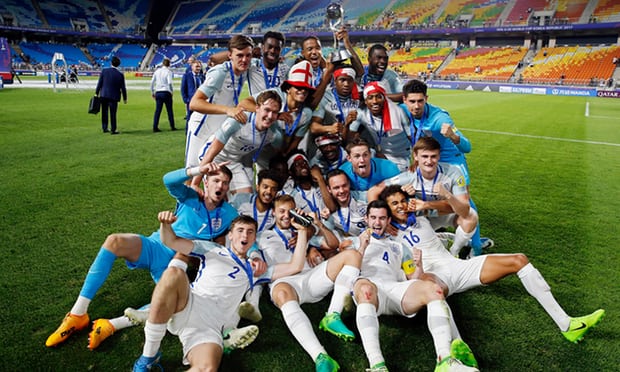London- Even after the exposure of familiar failings by familiar opponents at a familiar stage of the Under-21 European Championship, a rosy glow remains about English youth football. World champions at under-20 level, victors in the Toulon tournament, finalists in the European Under-17 Championship and semi‑finalists in the European Under‑21s, we have never had it so good. Call this generation golden and prepare for the bitter retrospectives when they have won nothing in a decade and the question of whether the Lewises Cook and Baker can play together in the same midfield remains frustratingly unresolved.
But enough of that: the transfer window has officially been open for three weeks, but as aficionados know it is on 1 July, after all those contracts that expire on 30 June have expired, that the wheeling and dealing really gets into full swing. And, amid the decadence of late capitalism, with recent falling viewing figures leading some to theorise that younger generations can no longer endure a full 90 minutes of actual football, it is trading far more than any naive ideal of sporting prowess that really gets social media humming.
The two, of course, are not unrelated. While it is obviously better that England field a strong side at the Under-20 World Cup than having 36 players withdraw for reasons of injury and indifference, as they did for the same tournament in 2011, it is perhaps worth asking why.
Of the 11 players who started the final against Venezuela in Suwon, only four had begun a Premier League game. Between them, that XI had 13 Premier League starts and 30 substitute appearances. Of those starts, nine had been for three players at Everton – Jonjoe Kenny, Ademola Lookman and Dominic Calvert-Lewin – and the others from Bournemouth’s Lewis Cook. That suggests that the reason Premier League clubs are now happy for their young players to head off in alternate summers to play in youth tournaments is not some recognition that tournament football will be good for their long-term development but that they just do not really need them. Who actually suffers if one of the three Chelsea players in that Under-20 squad comes back a little weary? Not Chelsea, but the club to whom they were going to loan him.
This is the curse of growing up in a Premier League academy. Whatever the impact of EPPP or the England DNA programme, or any of the other ways the FA is claiming credit for the sudden upturn in youth results, there remains an enormous hurdle for those players in actually getting in to first teams.
Chelsea are not the only guilty party, but given their success at youth level – they have won four FA Youth Cups in a row and six of the past eight as well as two of the past three Uefa Youth Leagues – and the fact they had a league-high 48 players out on loan last season, their fault is more obvious than others.
They had three players in the England Under-20 squad – the defenders Fiyako Tomori and Jake Clarke-Salter and the forward Dominic Solanke – and three players in the Under-21 squad – Nathaniel Chalobah, Lewis Baker and Tammy Abraham. Those six players have between them started one league game for Chelsea. Little wonder Solanke, top-scorer at the Under-20 World Cup, got sick of waiting for his chance and opted to move on a free to Liverpool. Would it be any great surprise if Chalobah, watching Chelsea eye up Tiemoué Bakayoko, who is just five months older but has started 49 league games for Monaco as well as being a mainstay of the side that got to the Champions League semi-final, decided he did not fancy being loaned out to a seventh club? At last, perhaps, young players are recognising the dangers of being stockpiled.
The example of Nemanja Matic, sold to Benfica and bought back three years later, feels increasingly emblematic, almost as though the only way Chelsea could get him the necessary experience was effectively to pay another club to be a finishing school. The question then is why?
Ronaldo Koeman has shown, both at Southampton and Everton, how young players can thrive in the Premier League, yet managers of the next tier of club up – with the possible exception of Mauricio Pochettino – seem terrified of trusting youth. Disappointingly that seemed true last season even of Pep Guardiola, despite his promotion of youth at Barcelona and Bayern Munich.
But it is not just managers who are to blame. It feels as though there is a cultural issue here, a consumerist lust for the buying and selling of players that is all-pervasive. Players love transfers because they tend to improve their contracts and often take a slice of the fee. Managers love transfers because they always have the excuse of needing just one or two more players. Agents love transfers because they get paid for them. Directors of football and other executives love transfers because it justifies their existence and gives them the chance to pose with new signings. Journalists love transfers because it gives us something to write about. Fans love transfers because a new toy is always the best toy.
In the short term, everybody benefits from the frenzy of buying and selling. Except, of course, in the end, a world based on spending ends up reifying the power of the wealthy, stifles tactical experimentation and hampers youth development.
And so, ultimately, football and everybody loses.
The Guardian Sport
